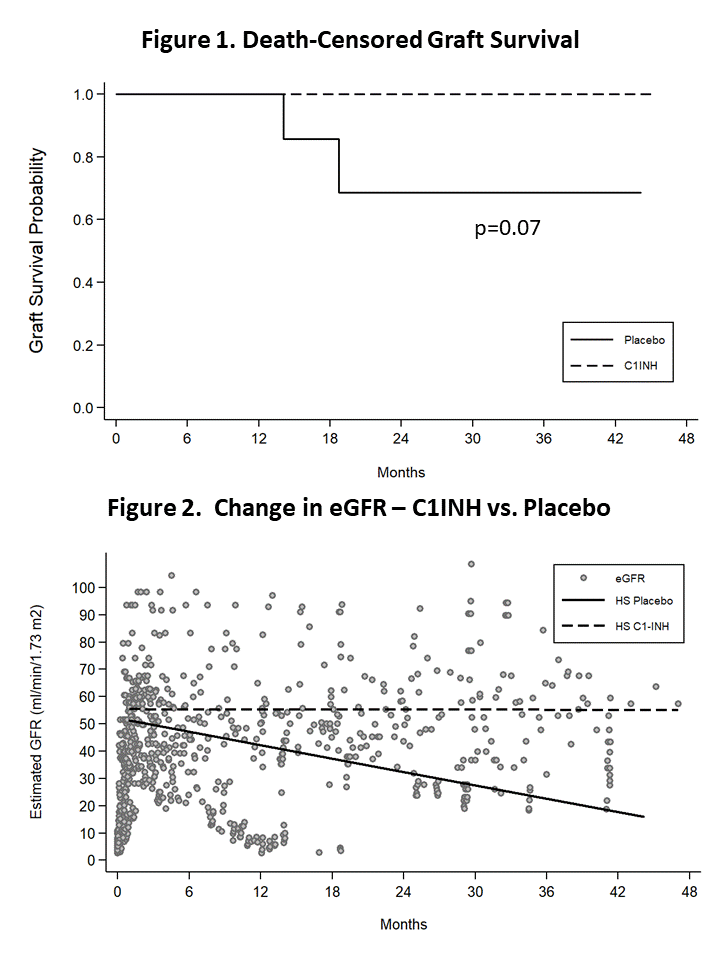Prevention of Ischemia Reperfusion Injury (IRI) & ABMR in HLA Sensitized Patients Treated with C1 Esterase Inhibitor (C1INH): Long-Term Follow Up
Cedars Sinai Medical Ctr, Los Angeles, CA
Meeting: 2019 American Transplant Congress
Abstract number: 111
Keywords: Glomerular filtration rate (GFR), Highly-sensitized, Ischemia, Kidney transplantation
Session Information
Session Name: Concurrent Session: Kidney Acute Antibody Mediated Rejection
Session Type: Concurrent Session
Date: Sunday, June 2, 2019
Session Time: 4:30pm-6:00pm
 Presentation Time: 4:42pm-4:54pm
Presentation Time: 4:42pm-4:54pm
Location: Ballroom B
*Purpose: Delayed graft function (DGF) after kidney transplantation is a consequence of IRI/DGF. IRI/DGF requires intense medical management, is costly and predisposes to risk for AR. Recent data show that complement activation may be an important mediator. In HLA sensitized (HS) patients, this can contribute to poor outcomes. We previously showed that patients who were randomized to receive C1INH (serine protease inhibitor that inhibits MBL/MASP) had earlier recovery from delayed graft than placebo. Here we report a post-hoc analysis on long-term outcomes in the subgroup of HS patients enrolled in the prior randomized placebo-controlled study.
*Methods: From November 2014 – February 2017, 70 patients at risk for IRI/DGF were enrolled and randomized 1:1 to receive C1INH 50U/kg (n=35) vs. placebo (n=35) intra-operatively & 24hrs later. Of the 70 patients, 17 were HLA sensitized. All transplanted HS patients received antibody induction with alemtuzumab and were maintained on standard immunosuppression with tacrolimus, cellcept, and tapering prednisone. Rejection episodes, patient and graft survival, and eGFR up to 48M were compared between recipients of C1INH and placebo.
*Results: Ten patients received C1INH and 7 received placebo. Briefly, cPRA 99-100% & previous transplants were similar between the 2 groups. All patients were off dialysis by day 15 and no significant differences were seen with time to dialysis cessation between C1INH and placebo. No ABMR was seen in C1INH treated patients vs. 2 patients (29%) in placebo. CMR was seen in 2 patients (20%) in C1INH vs. 1 patient (14%) in placebo. There were no graft losses among C1INH patients vs. 2 graft losses in placebo (p=0.07) {Fig 1}. One death occurred in the C1INH group @ 41M post-transplant d/t sepsis. A linear mixed effects model observed progressive deterioration in eGFR up to 48M in the placebo group (slope eGFR: -10.0 ml/min/1.73 m2, 95% CI: -18.5 to -1.48), whereas eGFR was stable among C1INH-treated recipients (slope eGFR: -0.08 ml/min/1.73 m2 per year; 95% CI: -6.97 to 6.81) {Fig 2}.
*Conclusions: C1INH therapy was associated with sustained graft survival with no antibody rejection episodes. There was progressive deterioration in eGFR among placebo treated patients, suggesting that the addition of C1INH may lead to long-term preservation of graft function in HS patients receiving donor allografts at risk for IRI/DGF.
To cite this abstract in AMA style:
Vo AA, Huang E, Ammerman N, Choi J, Kim I, Peng A, Najjar R, Sethi S, Lim K, Jordan SC. Prevention of Ischemia Reperfusion Injury (IRI) & ABMR in HLA Sensitized Patients Treated with C1 Esterase Inhibitor (C1INH): Long-Term Follow Up [abstract]. Am J Transplant. 2019; 19 (suppl 3). https://atcmeetingabstracts.com/abstract/prevention-of-ischemia-reperfusion-injury-iri-abmr-in-hla-sensitized-patients-treated-with-c1-esterase-inhibitor-c1inh-long-term-follow-up/. Accessed February 27, 2026.« Back to 2019 American Transplant Congress

